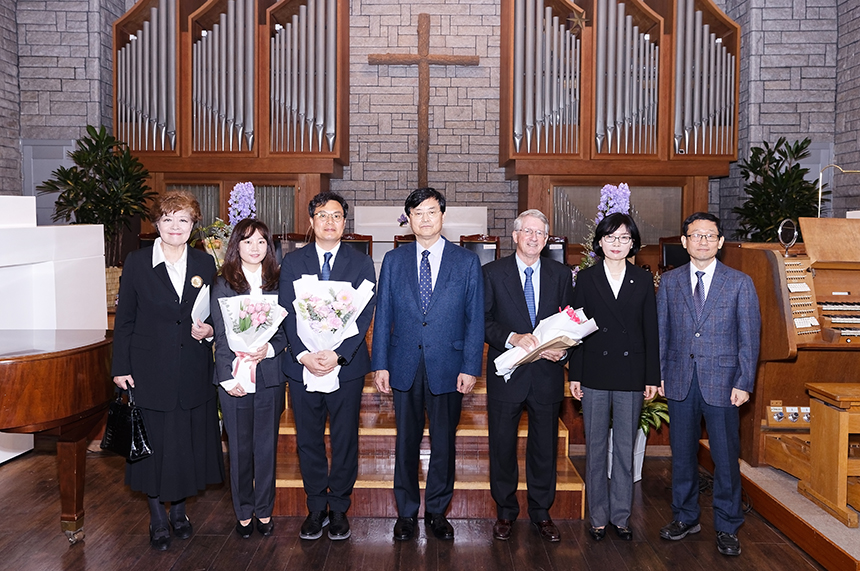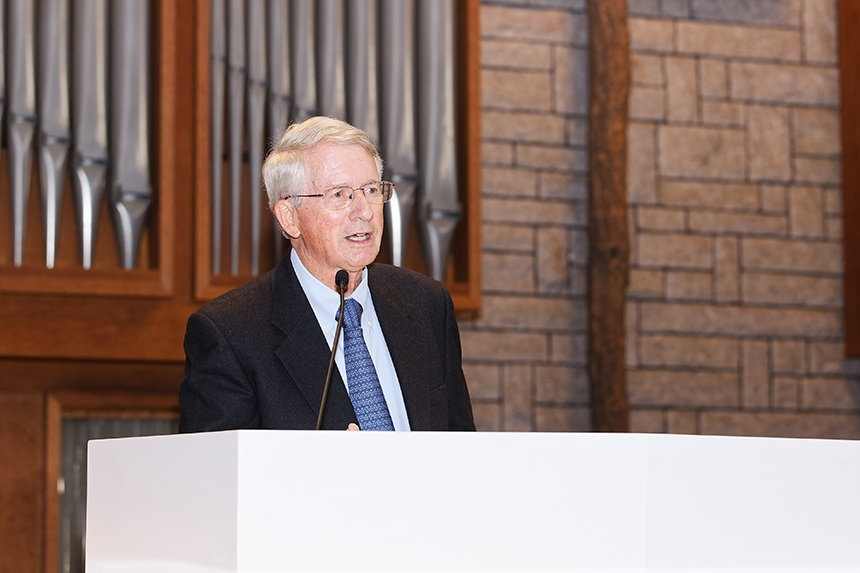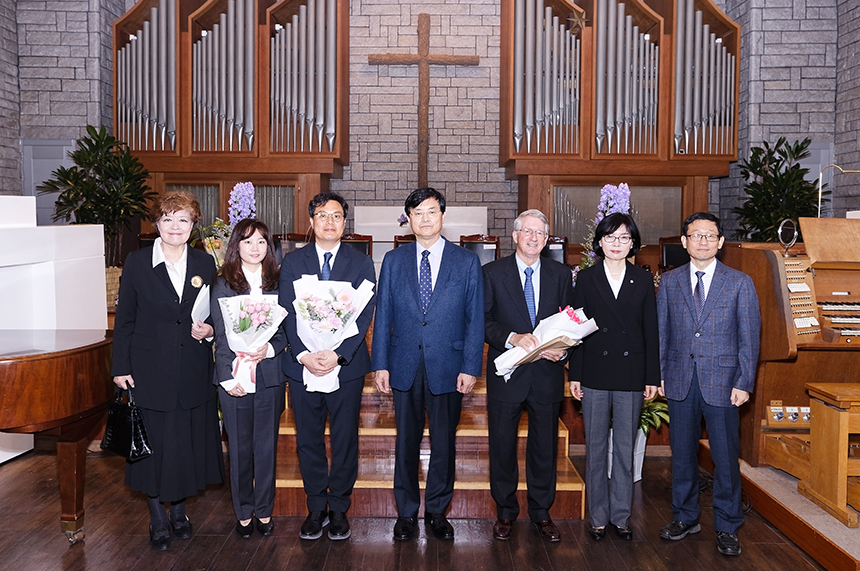- Edward J. Schultz, Professor Emeritus at the University of Hawaii, Wins the 29th Yongjae Award March 15, 2023
-
Yongjae New Scholar Awards to Dr. Kim Bong Guk of CNU and Dr. Choi Sihyun of Yonsei
 [Photo 1. (from left) Vice CEO Young Joo Kim of Daesung Group, Academic Research Professor Choi Sihyun of Yonsei University, Research Professor Kim Bong Guk of Chonnam National University, President Seoung Hwan Suh of Yonsei, Professor Emeritus Edward J. Schultz of the University of Hawaii, Provost Kim Eunkyoung of Yonsei, and Director Kim Seong Bo of Yonsei University Institute of Korean Studies]
[Photo 1. (from left) Vice CEO Young Joo Kim of Daesung Group, Academic Research Professor Choi Sihyun of Yonsei University, Research Professor Kim Bong Guk of Chonnam National University, President Seoung Hwan Suh of Yonsei, Professor Emeritus Edward J. Schultz of the University of Hawaii, Provost Kim Eunkyoung of Yonsei, and Director Kim Seong Bo of Yonsei University Institute of Korean Studies]The Yongjae Foundation Steering Committee selected Dr. Edward J. Shultz, a professor emeritus at the University of Hawaii at Manoa, as the winner of the 29th "Yongjae Academic Award." The "Yongjae New Scholar Awards" for rising researchers went to Dr. Kim Bong Guk, an HK research professor at the Institute of Honam Studies of Chonnam National University, and Dr. Choi Sihyun, an academic research professor at the Institute of Korean Studies of Yonsei University. The awards ceremony was held on March 10 at Luce Chapel.
The Yongjae Academic Award was established in 1995 to honor the academic virtues of Dr. "Yongjae" Baek Nak Jun, who served as Minister of Education of South Korea and the president of Yonsei University. It has been awarded annually to scholars who have made outstanding achievements in Korean studies and related fields.
This year's Yongjae Academic Award winner, Professor Emeritus Edward Schultz at the University of Hawaii at Manoa, contributed significantly to studying Korean medieval history and expanded Korean history research and education in the United States through a new understanding of the military regime during the Goryeo Dynasty era.
Professor Schultz is a leading scholar who has made outstanding achievements in studying and educating Korean medieval history in the United States. Professor Schultz was evaluated to have opened a new horizon in understanding Goryeo history by focusing on how Korean society has developed politically, socially, and institutionally, breaking away from the existing negative evaluation of the military regime during the Goryeo Dynasty.
In addition, he has translated essential materials for Korean studies research, such as "Goguryo bongi (Goguryeo's Records)" and "Silla bongi (Silla's Records)" of Samguk sagi (History of the Three Kingdoms), Goryeosa Jeolyo (Chronological History of Goryeo), and Hanguksa Sinron (New Review of Korean History), into English, which greatly helped researchers and students majoring in Korean studies in the English-speaking world. In addition, he criticized absurd claims on East Asian history issues from China and Japan and made great contributions to Korean history education in the United States as an educator. [Photo 2. Professor Emeritus Edward Schultz at the University of Hawaii at Manoa, the 29th Yongjae Academic Award winner]
[Photo 2. Professor Emeritus Edward Schultz at the University of Hawaii at Manoa, the 29th Yongjae Academic Award winner]
Professor Schultz visited Korea for the first time in 1966 and saw President Park Chung-hee's regime, feeling a sense of the problem that there might be a similar connection with the military regime of the Goryeo Dynasty. In other words, both Park Chung-hee of the 20th century and Choe Chung-heon of the 13th century were the ones who staged the coup, but they achieved rapid growth in the economy and culture and valued civil administration even though they both took power with military power. This awareness of the problem came to fruition with publication of his book Generals and Scholars - Military Rule Medieval Korea (University of Hawai'i Press, 2000) and its Korean version (2014). In addition, he donated Cheokamjip, a Confucian printing woodblock, which he had personally owned, to the Korean Studies Institute.
Dr. Kim Bong Guk's book, Cold War and Struggles (Seonin, 2018), traces how the framework of world perception of the "Cold War" was formed, spread, and settled in South Korea after liberation from Japanese colonial rule. The study analyzed the patterns that various political forces and intellectuals in South Korean society actively interpreted, evaluated, and semanticized the perception framework of the "Cold War." Through this, he dynamically presented the politics of the perception of the "world" in conjunction with changes in the situation inside and outside South Korean society. This book is a masterpiece that densely reads the political and ideological turbulence of the eight-year history of South Korea's liberation from the perspective of the "Cold War," from divided occupation by the United States and the Soviet Union, left-right confrontation, division, and the Korean War.
Dr. Choi Sihyun's book, How Real Estate Became Women's Work (Changbi, 2021), traces the colorful residential life history of 25 middle-class women born between the 1950s and 1980s. It revealed multifaceted and complex women by closely examining the lives of women who desired houses for various reasons, such as moving from one apartment to another for their children's education or using disguise names to make a fortune. In addition, with deep insight and a cool writing style, it is never limited to women's studies but contains a variety of implications that can be used for housing and real estate research. In particular, it implied that if the expectation that real estate can lead a good life even after avoiding labor becomes possible, the possibility that speculative tendencies toward housing will continue will increase.
show mobile menu
mobile menu




